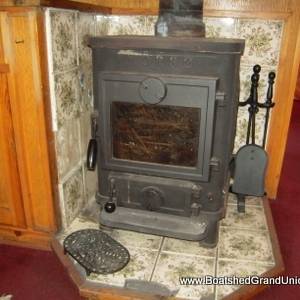
Boat safety: What the beep?!
Last week a mother and her daughter (aged 10) died of suspected carbon monoxide poisoning. Three people were on board the boat on Windermere and early enquiries suggested a faulty generator could have been to blame.
This tragic story reminded me of when a carbon monoxide alarm saved my life. I lived alone on a little red narrowboat in my twenties. Standing in a DIY shop choosing a new smoke alarm I had wondered whether to bother buying a carbon monoxide alarm too. Do I need it? I already had a cardboard carbon monoxide detector, which displayed a coloured spot if it detected CO. My boyfriend advised me that I should get the beeping version, “After all,” he said, “You never need it – until you need it!”
Some months later I was asleep on my boat with a cosy fire burning in the solid fuel stove. I awoke to a clattering in the other part of the boat. I sleepily assumed that my guitar had fallen over somewhere in the living room and went back to sleep. I was then awoken again by a beeping alarm. Why on earth is that going off?
I went into the living room to find my chimney flue had broken at the bend, and the middle section had completely fallen off (with a loud clattering sound!) Although the fire had died to an ember and there was no smoke to be seen, the little alarm was persistently telling me that the boat must be full of colourless, odourless carbon monoxide! I opened all the windows, hatches and doors and sat in the darkness on the back deck, until I thought it might be safe to return. Despite it being winter I then of course put the fire out and slept with the hatch above my bed quite open.
For me it was the stove, but various appliances, engines, generators and blocked ventilation could all be to blame in a carbon monoxide tragedy. Adequate ventilation is one of the requirements of a vessel being awarded a boat safety certificate.
The Boat Safety Scheme website says,
"Each year boaters die or are made seriously ill from carbon monoxide (CO) poisoning - Boats are built to keep water out, but this also makes them good containers for gases and fumes."
There are 10 top tips on their website to keep you alive.
The need for BSS requirements and certification is applied by the relevant navigation authority or harbour authority. The big three navigation authorities in the UK are The Canal and River Trust, The Environment Agency and The Broads Authority. 14 navigation authorities use the BSS in the UK.
However, the Boat Safety Certificate only applies to non-tidal waters so any boat kept on the coast in a tidal area does not have to comply. Insurance companies ask about any safety issues found on a survey and then expect boats to have a fire blanket and fire extinguisher, but not smoke or CO alarms.
That means it’s up to the individual to decide whether they want or need a carbon monoxide alarm on their boat. The ones that beep cost around £20.
Have you got one on your boat?
Peggy
www.narrowboatwife.com
You may also like:
How to buy a boat – the process / Thinking of selling your boat? / Boatshed registers 500,000th customer! / New Boatshed brokerage opens in Cyprus / Get started with your own Boatshed business / More news articles and stories.
See when the next boat auction is.
New here? Follow us on Facebook or Twitter to hear of new listings, and regular boating, sailing and brokerage news.

